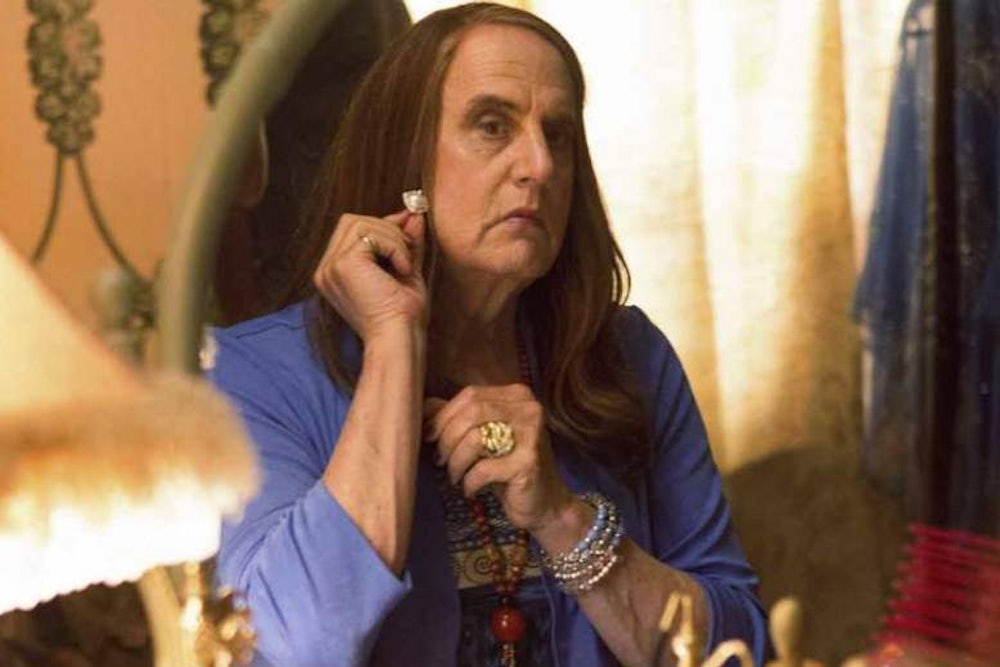In May, Time magazine put “Orange is the New Black” actress Laverne Cox on its cover, announcing a transgender tipping point in American culture. Next Friday, Amazon will make the first season “Transparent” available to stream online, marking another cultural breakthrough—the first television show to focus primarily on a transgender character. As Mort Pfefferman, an L.A. father of three in the middle of becoming Maura, Jeffrey Tambor gives his most serious and poignant performance yet in this melancholy comedy. I got on the phone with the “Arrested Development” star a few days ago to talk about the new show, what it’s like to play a woman, and his transgender education.
Esther Breger: Thanks for talking to me this morning. How are you?
Jeffrey Tambor: Well, I just flew back from Los Angeles last night and I’m just sitting here having a cup of coffee right now. In fact, as you just said “how are you?” I just spilled coffee on my undershirt.
EB: [laughs] I’m sorry.
JT: Well, if you’re so sorry why are you laughing? No it’s OK. I do it every single morning, and I am constantly ordering undershirts. That’s what I do. That’s my living.
EB: So this is your first time playing a transgender woman. What did you do to prepare?
JT: First of all, the map is beautifully laid out within the writing. Then I was fortunate enough to work with three consultants from the transgender community. One was the great Jenny Boylan, who’s a consultant to the production, and I prepared by reading her books. We met at the famous Algonquin room in New York, and we had a great afternoon. I queried her and we talked, and she’s so wonderful and knowledgable and human and just terrific. And then the production hired two other consultants from Los Angeles: Rhys Ernst and Zachary Drucker. And they helped me and aided me so much in getting through to [the character that I play,] Maura.
There’s a fail-safe in Maura that’s very very interesting and very human. Maura’s very early into her transition, and so she makes a lot of mistakes emotionally and technically. And I heard this is quite common—it takes a while to learn makeup, yes? And so Maura’s not quite there yet with her make-up skills. Maura has an arthritic left knee because Jeffrey has an arthritic left knee. Maura has reading glasses because Jeffrey has reading glasses. Maura has a little trouble hearing in the left ear because—you know what I’m trying to say. My goal was to make her—it sounds glib when I say it, but my politics are in my performance—I tried to make her as human as possible and as real as possible. And I tried to make her not an idea, not a symbol, but a real person who’s coming out and making a break for her authentic self. At a late age making a break for her freedom. The irony of this is that in her transitioning and becoming a woman she finally becomes a true parent and the best parent that she can be.
EB: So what were some of the questions you had for Jenny Boylan and the other consultants?
JT: Mostly I asked them about their experiences. I don’t want to enumerate, but we talked personally and they were very forthcoming with their lives. It wasn’t so much to do with the externals—that all came very artfully and beautifully through [costume desginer] Marie Schley and from the make-up people and the wig people. ... I knew the biggest journey would not be the external journey but the interior journey.
Maura was very clear to me; I could actually see her. There are about half-a-dozen projects in your life where you say, oh, I know who that is. And I knew Maura. My problem was that I had to get Jeffrey to her. And I found that sometimes difficult, and I found that sometimes easy. ... I like that she’s of age. She’s lived her years. And I’ve lived my years. I mean I think she’s pretty, but she’s not, you know, Christie Brinkley. And I like that about her.
The thing about me is that every day I learn something. I went from ignorance with a capital "I" to just every day learning something else. But Maura does, too. She learns every single day. And makes mistakes, and learns by the mistakes. But the basic question is: What happens when somebody in the family changes? What happens to the rest of the family? The question is: Will they still be there? Will they still love you? Will they still support you? What will happen to them? How will their dynamic change?
EB: When I interviewed Jill Soloway last spring she described you as “very feminine” and “very vulnerable.” Do you agree with that?
JT: Yes, I like that. I didn’t know she said that—or I spilled coffee on myself and I can’t remember. But I did find that Maura was available to me and still is. It’s a life-changing role and the most transformative role I have ever played and one that made me throw-up nervous at the beginning. But that’s actually kind of good. I like those nerves and that means something really important is going on. At 70 years old to be handed such a role is quite a gift.
This interview has been edited and condensed.
